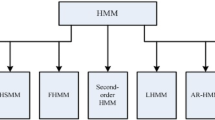Abstract
Current Particle Swarm Optimization (PSO) algorithms do not address problems with unknown dimensions, which arise in many applications that would benefit from the use of PSO. In this paper, we propose a new algorithm, called Dimension Adaptive Particle Swarm Optimization (DA-PSO) that can address problems with any number of dimensions. We also propose and compare three other PSO-based methods with DA-PSO. We apply our algorithms to solve the Weibull mixture model density estimation problem as an illustration. DA-PSO achieves better objective function values than other PSO-based algorithms on four simulated datasets and a real dataset. We also compare DA-PSO with the recursive Expectation-Maximization (EM) estimator, which is a non-PSO-based method, obtaining again very good results.
Similar content being viewed by others
References
Cohen, C. (1965). Maximum likelihood estimation in the Weibull distribution based on complete and on censored samples. Technometrics, 7(4), 579–588.
Correa, E. S., Freitas, A. A., & Johnson, C. G. (2006). A new discrete particle swarm algorithm applied to attribute selection in a bioinformatics data set. In Proceedings of the 2006 annual conference on genetic and evolutionary computation (pp. 35–42). New York: ACM.
Dempster, A. P., Laird, N. M., & Rubin, D. B. (1977). Maximum likelihood from incomplete data via the EM algorithm. Journal of the Royal Statistical Society, 39(1), 1–38.
Devicharan, D., & Mohan, C. (2004). Particle swarm optimization with adaptive linkage learning. In Proceedings of the 2004 IEEE congress on evolutionary computation (pp. 530–535). Piscataway: IEEE Press.
Figueiredo, M. A., & Jain, A. K. (2002). Unsupervised learning of finite mixture models. IEEE Transactions on Pattern Analysis and Machine Intelligence, 24(3), 381–396.
Hamdan, S. A. (2008). Hybrid particle swarm optimiser using multi-neighborhood topologies. INFOCOMP Journal of Computer Science, 7(1), 36–44.
Kamath, G., Ye, X., & Osadciw, L. A. (2008). Using swarm intelligence and Bayesian inference for aircraft interrogation. In Proceedings of the 2008 wireless communication and networks conference (pp. 3279–3284). Piscataway: IEEE Press.
Kececioglu, D. B., & Wang, W. (1998). Parameter estimation for mixed-Weibull distribution. In Proceedings of the 1998 annual reliability and maintainability symposium (pp. 1942–1948). Piscataway: IEEE Press.
Kennedy, J., & Eberhart, R. (1995). Particle swarm optimization. In Proceedings of the 1995 IEEE international conference on neural networks (pp. 247–252). Piscataway: IEEE Press. 1942–1948,.
Kennedy, J., Eberhart, R. C., & Shi, Y. (2001). Swarm intelligence. San Francisco: Morgan Kaufmann.
Murthy, D. N. P., Xie, M., & Jiang, R. (2003). Weibull models. Hoboken: Wiley-Interscience.
Oppenheim, A. V., & Schafer, R. W. (1989). Discrete-time signal processing. Prentice-Hall: Englewood Cliffs.
Parsopoulos, K., & Vrahatis, M. (2002). Recent approaches to global optimization problems through particle swarm optimization. Natural Computing, 1(2–3), 235–306.
Pena, J., & Upegui, A. (2007). A population-oriented architecture for particle swarms. In Proceedings of the 2007 NASA/ESA conference on adaptive hardware and systems (pp. 563–570). Piscataway: IEEE Press.
Poli, R., Kennedy, J., & Blackwell, T. (2007). Particle swarm optimization. Swarm Intelligence, 1(1), 33–57.
Pugh, J., & Martinoli, A. (2006). Discrete multi-valued particle swarm optimization. In Proceedings of the 2006 IEEE swarm intelligence symposium (pp. 103–110). Piscataway: IEEE Press.
Someya, H. (2008). Cautious particle swarm. In Proceedings of the 2008 IEEE swarm intelligence symposium (pp. 1–6). Piscataway: IEEE Press.
Veeramachaneni, K., Peram, T., Mohan, C., & Osadciw, L. A. (2003). Optimization using particle swarm with near neighbor interactions. In LNCS : Vol. 2723. Proceedings of the GECCO 2003 annual conference on genetic and evolutionary computation (pp. 110–121). Berlin: Springer.
Veeramachaneni, K., Osadciw, L., & Kamath, G. (2007). Probabilistically driven particle swarms for discrete multi valued problems: design and analysis. In Proceedings of the 2007 IEEE swarm intelligence symposium (pp. 141–149). Piscataway: IEEE Press.
Yan, Y., & Osadciw, L. A. (2008). Varying dimensional particle swarm optimization. In Proceedings of the 2008 IEEE swarm intelligence symposium (pp. 1–8). Piscataway: IEEE Press.
Yuan, X., Peng, J., & Nishiura, Y. (2005). Particle swarm optimization with multiscale searching method. In LNCS : Vol. 3801. Proceedings of the CIS 2005 international conference on computational intelligence and security (pp. 669–673). Berlin: Springer.
Zhang, W.-J., & Xie, X.-F. (2003). DEPSO: hybrid particle swarm with differential evolution operator. In Proceedings of the 2003 IEEE international conference on systems, man & cybernetics (pp. 3816–3821). Piscataway: IEEE Press.
Zhang, D., Guo, H., & Luo, B. (2008). An algorithm for estimating number of components of Gaussian mixture model based on penalized distance. In Proceedings of the 2008 international conference on neural networks and signal processing (pp. 482–487). Piscataway: IEEE Press.
Zivkovic, Z., & van der Heijden, F. (2004). Recursive unsupervised learning of finite mixture models. IEEE Transactions on Pattern Analysis and Machine Intelligence, 26(5), 651–656.
Author information
Authors and Affiliations
Corresponding author
Rights and permissions
About this article
Cite this article
Yan, Y., Osadciw, L.A. Density estimation using a new dimension adaptive particle swarm optimization algorithm. Swarm Intell 3, 275–301 (2009). https://doi.org/10.1007/s11721-009-0032-x
Received:
Accepted:
Published:
Issue Date:
DOI: https://doi.org/10.1007/s11721-009-0032-x




